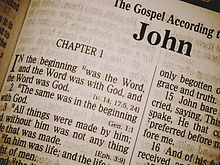
"In the beginning" (bereshit in Biblical Hebrew) is the opening-phrase or incipit used in the Bible in Genesis 1:1. In John 1:1 of the New Testament, the word Archē is translated into English with the same phrase.
Etymology
The translated word in the Hebrew Bible is bereshit (בְּרֵאשִׁית): 'In beginning'. The definite article (the) is missing, but implied.
Archē (Ancient Greek: ἀρχή) is the original word used in John 1:1.
The word "Bereshit" is poorly translated. Indeed, Thomas Römer, Administrator of the Collège de France and full professor of the chair "Biblical environments" reminds us that according to the Massoretes, the written tradition, Bereshit is "a beginning" among other possible ones and not the absolute Beginning.
Usage
The King James Version of Genesis 1:1 is translated as "In the beginning God created the heaven and the Earth." The King James Version of John 1:1 is translated as "In the beginning was the Word, and the Word was with God, and the Word was God."
Tradition and theology
In Judaism
| This section does not cite any sources. Please help improve this section by adding citations to reliable sources. Unsourced material may be challenged and removed. (April 2022) (Learn how and when to remove this message) |
The Book of Genesis as a whole has the title of Bereshit (בְּרֵאשִׁית) by its incipit in Hebrew, as with other books of the Hebrew Bible. The first word, and thus God's role as Creator, is recited in the Aleinu prayer near the end of each of the three daily prayer-services.
In Christianity
Further information: Logos (Christianity)
Genesis 1:1 is commonly paralleled by Christian theologians with John 1:1 as something that the author alluded to. Theologian Charles Ellicott wrote:
The reference to the opening words of the Old Testament is obvious, and is the more striking when we remember that a Jew would constantly speak of and quote from the book of Genesis as "Berēshîth" ("in the beginning"). It is quite in harmony with the Hebrew tone of this Gospel to do so, and it can hardly be that St. John wrote his Berēshîth without having that of Moses present to his mind, and without being guided by its meaning.
See also
References
- Blenkinsopp 2011, pp. 30–31.
- https://www.radiofrance.fr/franceculture/podcasts/les-cours-du-college-de-france/introduction-que-sont-la-bible-hebraique-et-l-ancien-testament-3048117
- Jobes 2014.
- Ellicott's Commentary for English Readers on John 1, accessed 22 January 2016
Sources
- Blenkinsopp, Joseph (2011). Creation, Un-Creation, Re-Creation: A Discursive Commentary on Genesis 1–11. T&T Clarke International. ISBN 9780567372871.
- Jobes, Karen H. (2014). 1, 2, and 3 John. Zondervan Academic. ISBN 978-0-310-51801-3. Retrieved 22 July 2020.
Further reading
- Hoffman, Joel (2004). In the Beginning: A Short History of the Hebrew Language. NYU Press. ISBN 978-0-8147-3706-4. Retrieved 21 July 2020.
- Friedman, David B. (2010). Bereshit, The Book of Beginnings: A New Translation with Commentary. Wipf and Stock Publishers. ISBN 978-1-4982-7178-3. Retrieved 21 July 2020.
- Burg, Avraham (2012). Very Near to You: Human Readings of the Torah. Gefen Publishing House Ltd. ISBN 978-965-229-564-4. Retrieved 21 July 2020.
| Genesis 1 | |||
|---|---|---|---|
| Noted verses |
| ||
| Divine figures | |||
| Creation |
| ||
| Phrases |
| ||
| Characters | |||
| Related | |||
| Gospel of John | |||||
|---|---|---|---|---|---|
| Bible (New Testament) |
| ||||
| Events (chronological) |
| ||||
| Phrases | |||||
| People |
| ||||
| Places | |||||
| "I AM" sayings | |||||
| Related | |||||
| Adaptations |
| ||||
| Manuscripts | |||||
| Sources | |||||